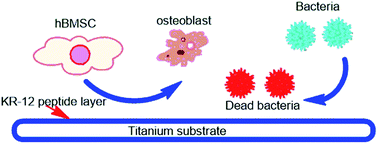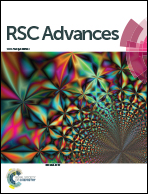Covalent immobilization of KR-12 peptide onto a titanium surface for decreasing infection and promoting osteogenic differentiation
Abstract
Infection and poor bone-implant integration are the two main reasons for titanium (Ti) implant failure. Here, we investigated the feasibility of functionalizing Ti with the antimicrobial peptide, KR-12, derived from the human cationic antimicrobial peptide. The minimal inhibitory concentration and cell viability effects of KR-12 were investigated prior to immobilization on the Ti surface. The results showed that KR-12 possessed a wide anti-bacterial spectrum with no cytotoxicity to human bone marrow mesenchymal stem cells (hBMSCs). Successful covalent immobilization of KR-12 onto an amine-functionalized Ti (Ti-KR-12) surface was characterized by X-ray photoelectron spectroscopy. Gram-positive bacteria, Staphylococcus epidermidis and methicillin resistant Staphylococcus epidermidis were employed for antibacterial characterization. Ti-KR-12 substrates could significantly inhibit adhesion and colonization of common pathogenic bacteria and the drug resistance of pathogenic bacteria. The results of the CCK-8 assay, confocal laser scanning microscopy, and scanning electron microscopy showed that KR-12 covalently immobilized on Ti improved adhesion and proliferation of hBMSCs. The osteogenic differentiation of hBMSCs on samples was investigated by alkaline phosphatase staining, sirius red staining, alizarin red staining, and real-time PCR. The staining and real-time PCR results demonstrated that hBMSCs grown on Ti-KR-12 surfaces for 10 and 14 days under conditions inducing osteogenic differentiation displayed significantly higher alkaline phosphatase activity, larger extracellular matrix calcium deposition area, and higher expression of alkaline phosphatase, osteocalcin, osteopontin, and collagen type-1 mRNA than bare Ti. Our results demonstrated the KR-12 peptide was suitable for improving the biological properties of bioinert titanium. KR-12 showed antibacterial activity and the capability to promote cell proliferation and Ti-KR-12 surfaces significantly decreased bacteria adhesion, whilst promoting the osteogenic differentiation of hBMSCs.


 Please wait while we load your content...
Please wait while we load your content...